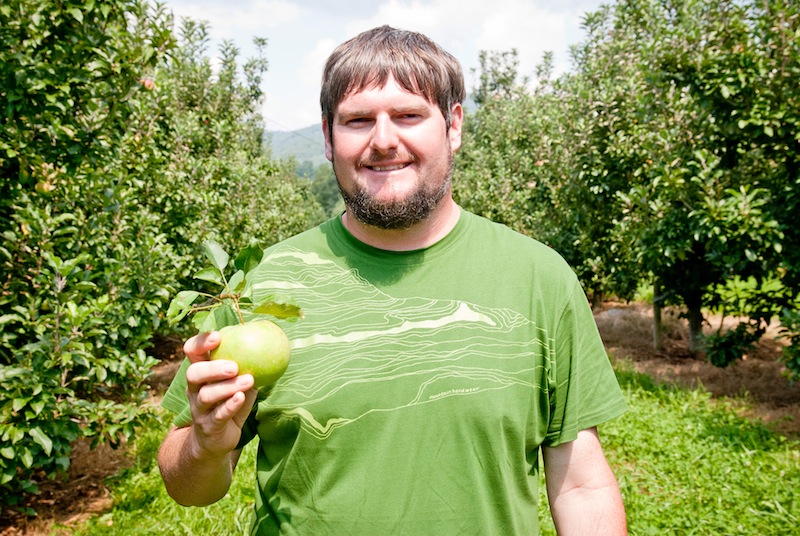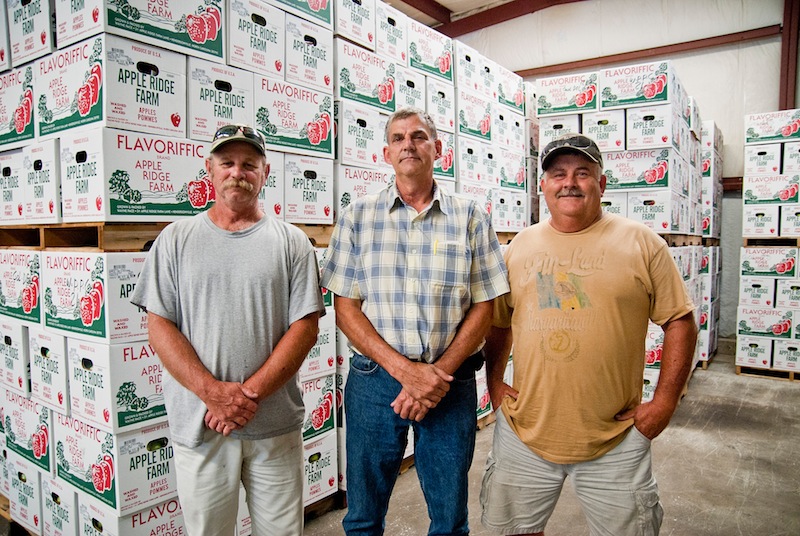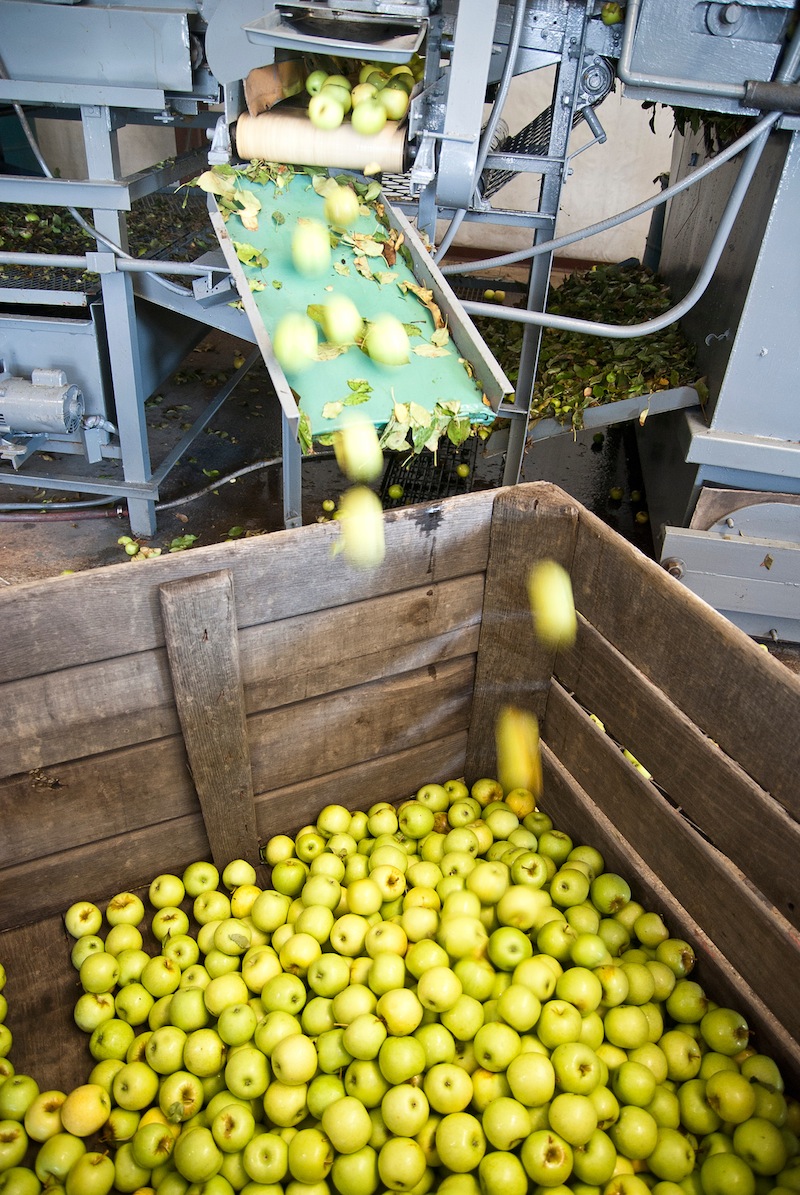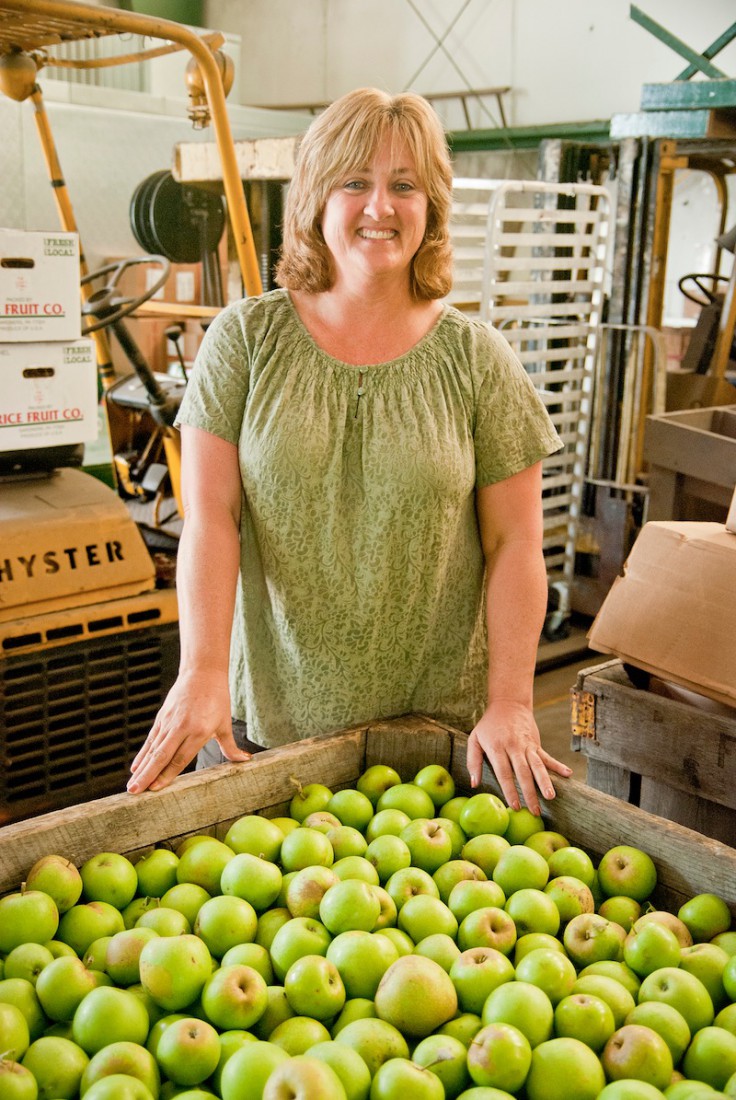In high summer, when the heat reaches its peak, there's energy and excitement in apple country. The fruit brightens on the branch as growers prepare to pick the earliest varieties — Honeycrisp, Gala, Golden Delicious and Green Mutsu. Ripening and readiness beam from the trees in clusters visible from the roadsides. Harvest season begins. Picking time in Henderson County is a seasonal herald.
According to the 2007 Census of Agriculture, the county is the nation's seventh-largest apple producer, an industry that officially dates back to the early 1930s (when the state began collecting data). Beyond official statistics, it's far older. Legend has it that William Mills, an early settler in the area, planted the first apple trees on his farm in Fruitland in the late 18th century – crabapples are the only variety native to America; settlers brought the sweet varieties from their home countries.
Although the area's apples have a long history, the industry has changed rapidly in the past two decades. In 1983 — the height of production — apples produced in North Carolina were worth $415 million, according to state agricultural statistics. But when the National Fruit plant in Lincolnton closed in 1997, and the Gerber plant in Asheville closed in 1998, many nearby growers, who grew fruit for processing into baby food and apple sauce, gave up. By 2001, the apple industry was worth just $16 million statewide, and orchard acreage in Henderson County had decreased by about half.
That decline may be reversing. Growers are devoting more land to apples, according to Marvin Owings, director of the Henderson County Extension. Despite a devastating freeze in April that destroyed approximately 85 percent of the crop, the industry seems to be on the upswing. Families who have worked Henderson County orchards for generations are looking to new business strategies and consumer groups to reinvent the apple and hold on to their way of life.
The next generation
“That's the best thing in the world,” says Adam Pryor. “On a cool fall morning, to be able to be out in the orchard, and everything's getting going, and it will be in the upper '50s like it was this morning — and go up to a tree and be like, 'That one!' And grab it and wipe it off — you've got moisture on it from the dew and fog — and get it all nice and shiny and eat it right then.”
He's standing ankle-deep in the greenery of the Edneyville farm where he's lived and worked with his family for his entire life. As he explains the workings of the apple orchard, he reaches out to some branches and handles them with intimate familiarity. He can rehash the life of every apple: how it developed its particular color and size, its perfections and its flaws.
But he's not the typical grower. At 30, he's about half the age of the average North Carolina farmer — 57.2 years old, according to the 2007 Census of Agriculture. The aging farming community and the changing circumstances of their descendants have pose major setbacks to apple production.
Marvin Owings, director of the Henderson County Extension, works as a liaison between apple producers and consumers. “There are some growers that I know that are, say, in their 60s, and they discouraged their children from going into the apple business just because it is difficult,” he explains. “Some of the growers wanted their sons and daughters to get into other fields that weren't quite as demanding.”
After the major processing facilities left Western North Carolina, many growers abandoned their orchards and sold the land to housing developers. “I can show you orchards that have been abandoned since the plant closed,” Pryor explains. “I'm growing corn on a lot of orchard land that people said, 'Bulldoze 'em.'”
Pryor recognizes the financial rationale for giving up farming. The value of his family's property has increased as the area became more populated and non-agrarian industries moved in. When he enrolled in college at N.C. State, he planned to major in engineering, yet nearly every weekend and holiday, he found himself traveling back to the orchard to work. After his first year of college, he changed his major to agronomy and devoted his life to the family farm.
“A bad day doing this is better than a good day doing most other things,” he says. “You devote your life to it, but if you enjoy the lifestyle, it's very nice.”
His efforts have paid off. Every year, he's been able to expand the farm or start a new crop or project. He currently maintains about 110 acres of orchards, which he says is plenty to support his own apple-eating habit of about three a day during harvest time. But occasionally, in the middle of winter, he buys from the grocery store, and where most shoppers simply see an apple, he sees a product of a complex process.
“I look at what all went into producing that apple, and lots of times, what I look at is how much that apple costs, and I know what that grower actually made on it, and I know that the packer, the grocery store, the handlers, the freight — everything that went into it is about 80 percent of that, and what the grower got was 20 percent or less of that actual price,” he explains.
Even though he's not getting rich, Pryor says he will always grow apples. They're the fruit that sustained his father and his grandfather, and they're inextricably linked to his identity. With his studies in agribusiness (his minor at N.C. State) to back him up, he serves as president of the Blue Ridge Apple Growers and explores legislative, educational and marketing tactics to move his industry forward in an ever-changing marketplace.
The apple men
Lee Hill calls himself an apple man. “To me, it means everything in the world,” he says. “I've always told everybody that I live a dream life. I do. I get up every morning looking forward to going and doing what I do.”
With his partners, Wayne Pace and Billy McKay, he has run the packing house Apple Ridge Farms since 1982, where he prepares the fruit for distribution to grocery stores. From the road, the packing facility looks like a plain, corrugated-tin warehouse. But inside, it buzzes with activity. Golden Delicious apples move from one processing station to the next on a web of metallic track while workers sort, wax and bag them. Forklifts laden with boxes criss-cross the open floor, moving as quickly in reverse as when going forward. They come frighteningly close to one another but somehow avoid collision. For the outside observer, it's chaos. For the apple man, it's life.
Like Pryor, Hill has watched other packers sell their facilities and move on to fixed-income jobs while their children sell the family land. "Twenty years ago, there were as many as 30 packing houses here in the county, and that's dwindled down to about three of us now,” he recalls.
But when he thinks about why he stayed while the others left, he just shrugs his shoulders.
“I love it,” he says. I love growing apples. It's in my blood. I've always done it; my dad did it. I follow in his footsteps."

Apple Ridge contracts with a broker, Pexco Produce Sales, to market its fruit. Michael Peace comes up from the Florida office during picking time. He says Apple Ridge has made special adjustments to stay on-trend while other area packing houses fell behind and went under: "You guys have also kept up with the times and the newer and improved varieties,” he tells Hill.
In the past decade, specialized tastes have demanded new varieties, such as Honeycrisps and Pink Ladies. Not all growers are willing to adjust their orchards since most trees don't yield fruit until five years after planting.
“The old adage was 'pick, pack and sell,' and you can't do that any longer because the customer won't buy that fruit if they're not satisfied with the end product, and the customer is much more demanding than they used to be,” Owings explains from the county extension office.
For growers like Hill, producing a marketable apple means a shorter lifespan for his trees. “They might push out an orchard that's only 10 years old just because they need the apple to be redder,” he explains. “You can't send Bi-Lo or Kroger anything you want to send them. You got to have it right." The pressure for perfection has intensified due to competition with growers in Washington state, the largest producer of apples in the country.
Hill knows it's less demanding to grow processing-grade apples, but for him, producing packing-grade fruit is part of what it means to be an apple man. And as times change, he'll continue to stay on point with consumer tastes, growing ever-redder apples.

More than one way to sell an apple
Not everyone in Henderson county looks to the grocery stores to sell packing-grade fruit. As the market shifts, farmers use entrepreneurial tactics to bring the retail atmosphere directly to their orchards.
In the early '80s, Lola Coston and her family built an open porch on Highway 64 where they sold apples to tourists and other passersby from large palates. As the market declined, the Costons recognized the value of diversifying their business, and in the last 10 years, they have enclosed the porch to create an apple-oriented gift shop and bakery. They continue to sell fresh fruit from their 130-acre orchard, but much of the business has been parlayed into pies, ciders, breads, jams, honey, apple-oriented gifts and other sundries.
In addition to their roadside stand, the Coston family has weathered the difficult time by shipping processing-grade apples to plants in other locations and selling wholesale fruit to other area roadside stands. Coston says the retail community has branched out from apples — to everyone's benefit.
“Not everyone on the highway that has a roadside stand has the same things,” she explains. “We diversify with the canned goods and a few people are doing bakery items and gift shop items, but not everybody's doing the same thing.”
While packing houses are smarting from fickle consumer demands, Coston says local retailers like herself embrace changing consumer attitudes. “The 'buy local' and 'farm fresh' campaigns in the last five or six years have really helped the direct markets, because people are looking to buy more local fruit,” she says.

Along with about a dozen other growers, Coston will celebrate the industry upturn this weekend at the North Carolina Apple Festival in downtown Hendersonville, selling her fresh apples, baked goods and cider slushies. She hopes the community will come out to celebrate now and throughout the season, which is only just beginning. Picking time lasts until October, and once it's done, the Costons and the rest of the growers will begin preparing for next year. Despite the low yields this year, Coston remains optimistic. “I think things are looking up,” she says. “As I said, more people are buying locally and being more conscious of where their fruit comes from and the agriculture in general.”



Before you comment
The comments section is here to provide a platform for civil dialogue on the issues we face together as a local community. Xpress is committed to offering this platform for all voices, but when the tone of the discussion gets nasty or strays off topic, we believe many people choose not to participate. Xpress editors are determined to moderate comments to ensure a constructive interchange is maintained. All comments judged not to be in keeping with the spirit of civil discourse will be removed and repeat violators will be banned. See here for our terms of service. Thank you for being part of this effort to promote respectful discussion.